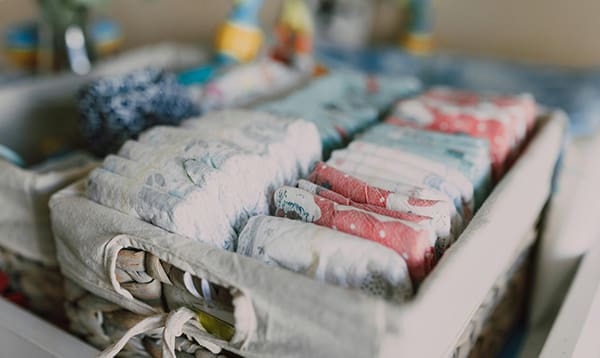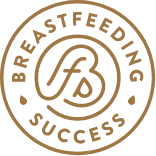By Ali Weatherford
You’ve probably seen a lot of lists to help you pack for birth at a hospital or birth center. It’s great to be prepared! What a lot of people don’t prepare for is the after part. If you’re having a hospital birth, you’ll likely stay there for 2-3 days of recovery time. They will probably provide you with a lot of the basics you’ll need for your recovery including menstrual pads for you and diapers for your baby.
But it’s a good idea to prepare ahead of time for your return home. You’ll still be in recovery for several more weeks, and there are some supplies that can help you be more comfortable as you recover. If you get some of these things ahead of time, you’ll probably be glad you did!
Supplies For Everyone
Everyone will need the things shown on this list. It doesn’t matter if you’re having a quick or slow or complicated or uncomplicated recovery. It doesn’t matter if you had a cesarean birth or a vaginal birth. These are the basics for everyone.
- Menstrual pads or adult diapers: Everyone will have vaginal bleeding after birth. Your placenta has to detach from the uterus and that leaves a big wound. It will bleed until it’s fully healed over. NO tampons or cups for this kind of bleeding. It’s good to have some heavy absorbency pads or diapers at first, but also other sizes all the way down to light absorbency options. The bleeding will gradually lessen over time, so make sure to have some of each size pads. Some people bleed for just a couple of weeks, but most people will bleed for 4-6 weeks. Some people can even continue to bleed for 12 weeks. Since it’s such a big range, you can probably just plan to have enough pads or diapers for 2 weeks and then get more as needed. The bleeding is usually heavy for the first 7-10 days.
- Comfortable clothes: Most people are going to prefer loose fitting clothes. A lot of people like gowns or loose dresses. Bellies will be a strange size and shape for a while after birth, so waistlines could be uncomfortable. If you have a cesarean, you especially might not like having anything around your waistline.
- Good food: You might make and store some freezer meals before you go into labor. You can also have people ready and waiting to bring you meals after you get home. You might even have someone at your home to cook for you. However you go about it, it’s great to make some plans for food! Consider setting up a Care Calendar to organize meal deliveries or use other helpful sites such as Lotsa Helping Hands, or Meal Train.
- Convenience stations: It’s best to rest. That means that you will be laying down a lot, especially in the first two weeks. To keep you from having to run around too much, stock a couple of baskets or bins with important supplies and have one at each of your favorite resting areas. You might have one near your bed and another next to the couch or anywhere else you are spending a lot of your time. You might include:
- Diapering supplies: a few clean diapers, a container of wipes, a changing pad or towel to put the baby on, a change of clothes for the baby in case of leakage, and plastic bags (it’s great to save your bread or produce bags from the grocery store for this!) for dirty stuff. If your baby has a diaper rash, you might also want to include cream and a clean towel to dry the baby’s bottom with before you apply the cream.
- Device chargers
- Remote controls
- Snacks
- Water
- Hair ties
- Cloths for catching leaks or wiping up spills
- Lip balm
- Lotion
- Glasses
- Medications/Vitamins/Supplements
- Journal or notebook and pen/pencil
- Headphones/earbuds
- Books
- Entertainment
- Hand sanitizer
- Extra pillows for comfort
Supplies For Some People
Not everyone will be sore or need to recover from stitches. Not everyone will have a cesarean incision to worry about or need pain medication. But things happen! If you have a more complicated recovery in front of you, or some special circumstances related to breastfeeding or baby care, consider some of the following supplies. Since you likely won’t know ahead of time if you need them, these purchases can probably wait until after you get home with your baby.
- Belly band or wrap: These are usually given to you after a cesarean birth, but some people like to have them after a vaginal birth too. A comfortable wrap can feel like a nice supportive hug around your belly if it doesn’t feel normal. Your organs are moving back into place and your belly can feel strange for a little while. This kind of support can be very comforting and possibly help with healing. Make sure not to use these if you have symptoms of pelvic organ prolapse.
- Perineal healing products: If you don’t have stitches or a tear that is healing, you may not need to stock up on these products, so it’s best to wait until you know. There are some products that can help with soreness and swelling or with the healing of a tear.
- Nipple healing products: These might include balms or ointments, or an actual device such as a gel pack or silver nipple cup. If your nipples get damaged by breastfeeding or pumping, these might be helpful for healing. But remember, the first step is to find out WHY your nipples are damaged by visiting a lactation consultant so you can correct the problem and heal completely.
- Breast pump: Not everyone needs to pump, especially during postpartum recovery. Most of the time, breastfeeding works just fine and pumping is not necessary to improve a milk supply or store milk. It’s actually most often recommended that you NOT pump, at least in the first couple of weeks after birth. For the best milk supply and breastfeeding success, it’s better to have the baby attach as much as possible, and sometimes pumping can interfere with direct breastfeeding. In some cases, pumping on a particular schedule might be recommended if there are issues with milk supply or if the baby is having trouble getting milk out of a breast. In that case, having your pump ready to go is great. If you know you’ll need one eventually anyway to go back to work, go ahead and order it through your insurance or through a Durable Medical Equipment (DME) provider who works with insurance. You can do this while you’re still pregnant so you won’t have to worry about it after the baby comes.
- Breastfeeding supplies: There might be some products that will make breastfeeding easier or more convenient for you. Not everyone will need these things, but here is a list of things that can be useful in some situations.
Getting Rest and Help
It might seem really overwhelming to imagine the kind of recovery that could require so many different things, but most of these things are optional and can just make things a little more comfortable for you even though they’re not actually necessary for your health and healing. In my opinion, the most important things to load up on for healthy recovery are REST and HELP.
Spend as much time as you can lying down with your baby skin-to-skin. It will literally help your body recover in so many amazing ways, and you’ll be bonding with your baby and helping to ensure a good milk supply too! You’ll be so glad you did once you’re fully healed and back to normal functioning. When full healing doesn’t happen, it can mean months or even years of discomfort and special care or treatment. Give your body the best chance to do it correctly the first time.
Asking for help can be really hard for some people, but well worth the effort. Asking for help is an important life skill. A lot of times we never learn to request help, or only learn when we’re desperate and have no other options. Don’t wait till then. Be proactive now and find ways to let your family and friends help you in small ways. Let them use their special skills to do something for you while you’re recovering. When you can be thoughtful about it and get it set up ahead of time, things will likely feel much more relaxed and enjoyable after your baby comes.

